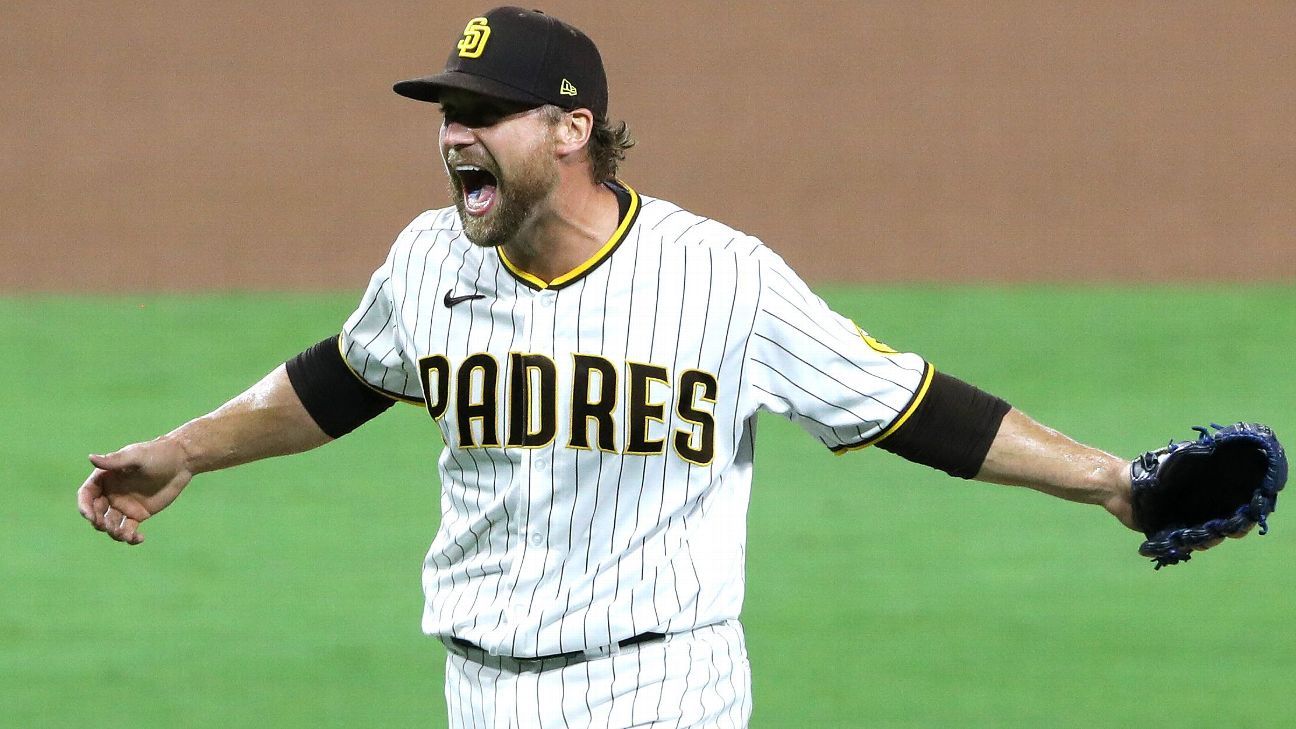This is not how the San Diego Padres would have preferred to draw up their first postseason series victory since 1998. They played three games against the St. Louis Cardinals and their starting pitchers threw a combined six innings. They used eight pitchers in a Game 1 loss, used nine pitchers in the wild 11-9 victory in Game 2, then used nine pitchers who combined for the series-clinching 4-0 shutout in Game 3.
We’ve never seen anything like this before. The Padres saw 78% of their innings come from the bullpen, with manager Jayce Tingler taking full advantage of his expanded 28-man playoff roster that included 14 pitchers. There had never been a combined nine-pitcher shutout in a nine-inning game in the regular season, but the Padres, with their two best starting pitchers injured and not on the active roster for this series, had planned for a bullpen game all along if the series went three games. What they hadn’t planned on were bullpen games in the first two contests after Chris Paddack and Zach Davies both got knocked out early.
So starting pitching is dead? No, not really. After all, it was just last postseason that the Washington Nationals won the World Series thanks to four dominant starters — and despite having the worst bullpen ERA in the majors. And you could argue that the key decision of the Padres-Cardinals series came in Game 2, when St. Louis manager Mike Shildt removed starter Adam Wainwright in the fourth inning with a 4-1 lead. Yes, the bases were loaded and the Cardinals got out of that inning allowing just one more run, but the quick hook forced Shildt to run through seven relievers, and eventually Genesis Cabrera couldn’t throw strikes, Giovanny Gallegos and Daniel Ponce de Leon allowed two home runs each, and his sixth and seventh relievers both allowed a run. Maybe that game turns out differently if Wainwright is allowed to pitch through that fourth-inning jam and is able to go deeper into the game.
The bullpen strategy worked for the Padres for a couple of reasons: They have a lot of really good arms down there, and they pitched well. It’s amazing how smart a manager can look when the players perform. Give Padres general manager A.J. Preller credit for adding bullpen depth at the trade deadline as well. Two of Friday’s pitchers were acquired in trades: slider specialist Austin Adams came over along with catcher Austin Nola from the Mariners; closer Trevor Rosenthal came over from the Royals.
Adams faced just one batter, but it was one of the biggest outs of the night. After Kolten Wong‘s soft single to left with two outs in the fifth inning and a Fernando Tatis Jr. throwing error, Adams came on to face Paul Goldschmidt with the game still scoreless. Adams had ACL surgery late last season with Seattle and was still on the injured list when Preller acquired him, but he was getting close to returning and Preller knew he had one of the most unhittable sliders in the game in 2019, when he had 51 strikeouts in 31 innings and batters hit just .133 against the slider. Adams almost jumps off the mound when he delivers the pitch, which must be an unsettling view for the batter. He threw six straight sliders to Goldschmidt, two way off the plate, two fouled off and then the final one that froze Goldschmidt, perfectly located low and away.
Tingler also got eight big outs from two kids who may be in San Diego’s rotation next year. Lefty Adrian Morejon, 21, got five big outs in the fourth and fifth, then 20-year-old Luis Patino threw a scoreless sixth, working around a Yadier Molina double and a walk to get Dexter Fowler on a fly to deep center field for the third out.
Morejon, from Cuba, and Patino, from Colombia, were part of the Padres’ 2016 international class, when ownership spent about $60 million for an extraordinary haul of young talent. (The Padres went well over their $3.3 million pool allotment and under the rules of the time paid a dollar-for-dollar tax that raised their spending from about $30 million in signing bonuses to the $60 million total.) Emilio Pagan (an offseason trade acquisition), Drew Pomeranz (an offseason free-agent signing) and Rosenthal cruised through the final three innings without allowing a hit, with Rosenthal striking out the side to end it.
So for the first time since beating the Braves in the 1998 NL Championship Series, the Padres move on in the postseason — and give us the series we all wanted: Padres vs. Dodgers, the up-and-coming team that is so fun to watch against the granddaddy of the NL West. The bullpen strategy will be a little more difficult to deploy in a best-of-five series with no off days, and we’ll find out if Dinelson Lamet and Mike Clevinger will be healthy enough to be activated. (According to Pedro Gomez’s in-game report, Lamet remains a possibility while Clevinger appears much less likely.)
It will certainly be fascinating to see how Tingler manages the series. Even though it’s a best-of-five, there is still a certain urgency to every game, and given the depth and dominance of the Dodgers’ own bullpen in the regular season, you don’t want to allow L.A. to break a game open early against a struggling starting pitcher and face the task of trying to rally late against the Dodgers’ bullpen. In other words: Get used to these Padres playoff games with six … seven … eight relievers. We may see more of them next week.
